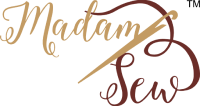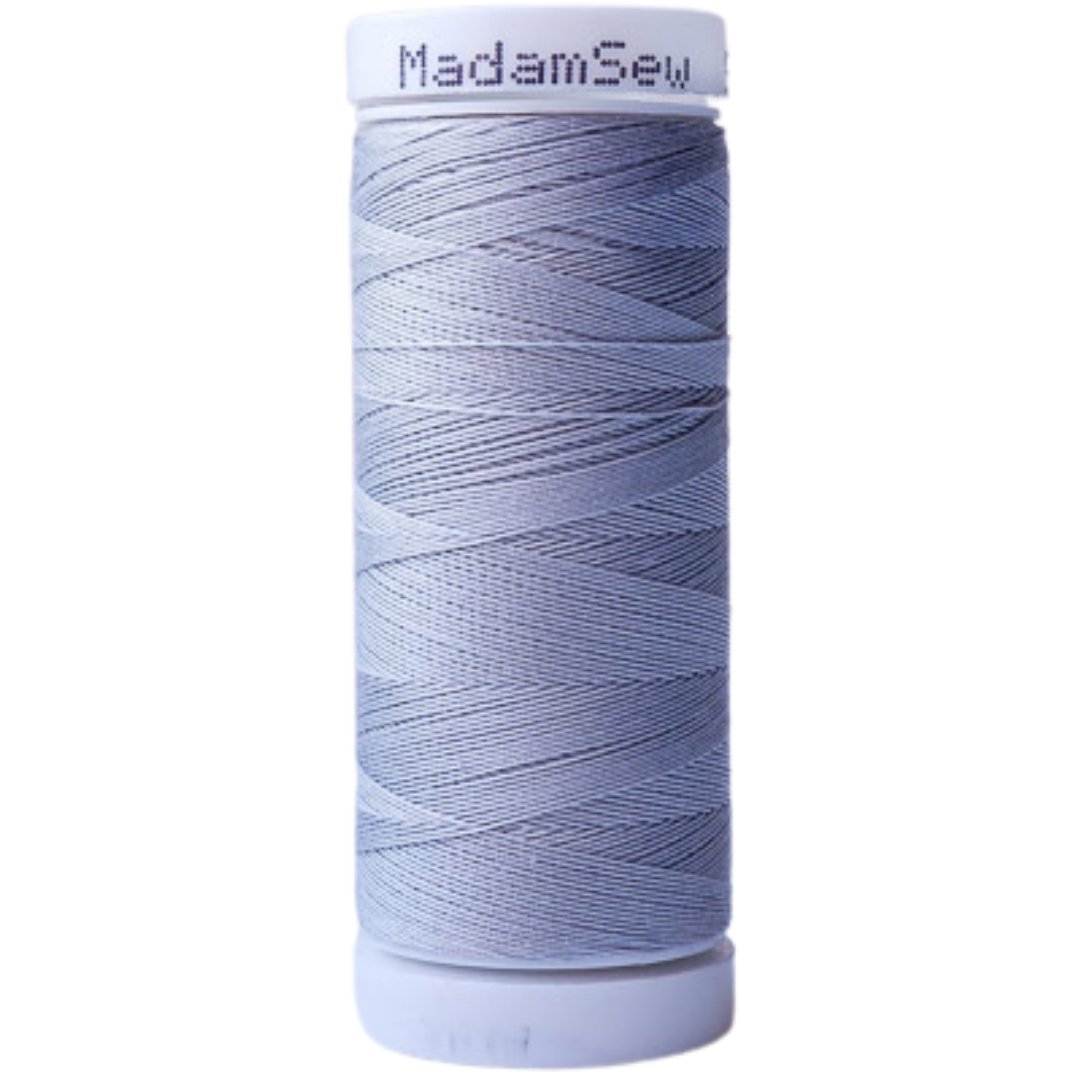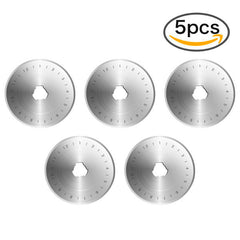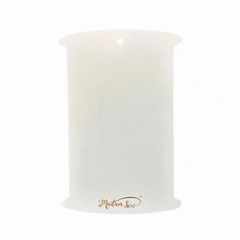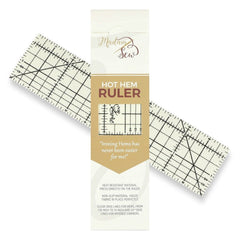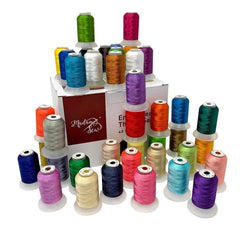How to Make A Jedi Robe In Any Size
Creating a Jedi cloak or robe is a rewarding and straightforward project that doesn't require a specialized pattern. Whether you're preparing for cosplay, aiming for Rebel Legion approval, or simply crafting a cool Halloween costume, this guide will help you create a high-quality Jedi robe. It’s designed to be adaptable to your needs and sewing skill level. You can also easily adapt this free pattern to other Halloween costumes by changing the color, length or width a bit. There is no downloadable pattern. I will explain step by step how to draw the robe on your fabric. Follow along and learn how you can make your own flowing, realistic Jedi robe.
Preparation
First make sure you gather all the materials and fabrics to make your robe. For good quality sewing tools, one stop: MadamSew.com :-))
Fabric & Thread
- 4-6 yards of fabric of 60 inches wide. Buy linen, cotton, or a blend—avoid pure polyester if you want an authentic look. The amount you need depends on the size of the robe you are making.
- Cotton or polyester sewing thread matching your fabric
Selecting the right fabric is crucial for your Jedi robe. Traditionally, Jedi robes are made of wool, but wool is expensive, heavy and not always very pleasant to wear. A good alternative is a linen or cotton blend, which is durable and easier to work with. Broadcloth or heavier cotton blends are great options for a flowing, authentic look. I found a medium-heavy fabric that is also used for curtains; there is polyester in it but it has a nice drape and it was only three dollars per yard. Not a bad deal, I think!
Tools You’ll Need
- Sewing machine (and a serger, if you have one)
-
(heavy-duty) Sewing machine needle (for thick fabric layers) and a regular hand sewing needle (optional, for hand stitching)
-
Sharp fabric scissors, electric fabric scissors or a rotary cutter + large mat
Step 1: Buy Enough Fabric
To know exactly how much fabric to buy to make your cloak, measure from shoulder to the floor to determine the length of the robe and add a few extra inches for hemming. A Jedi robe typically reaches below the ankles but you probably don’t want it to drag on the ground, especially for outdoor wear.
If you have 60 inch wide fabric, you can multiply the total length + some inches for the hem by two (2) for your total fabric needs and then add 40 inches for the hood. This is all depending on the width of your fabric. If you are making this for a small kid, you can probably do with less. Let’s say you want the robe to be 60 inches long (shoulder to heel). You need 120 inches + 3 inches + 40 inches = 163 inches. In this case, you should buy about 4.5 yards of fabric (60 inch wide).
When you have your fabric at hand, wash and dry it all to avoid any shrinkage later. This will ensure your robe maintains its shape after washing.
Step 2: Draw The Pattern Pieces and Cut Your Fabric
In total you need to cut 6 pattern pieces. Getting the shapes on your fabric probably seems daunting but it is pretty straightforward. You will cut:
- 2 front body pieces
- 1 back body piece
- 4 hood pieces, if you want your hood to be lined.
We will draw the pattern pieces for this Jedi robe directly on the fabric by hand with a fabric marker. To begin drawing and cutting, fold your fabric in half lengthwise.
The Hood
First, cut off a piece of fabric for the hood (60 inches x 45 inches). To make a lined Jedi hood, you need two rectangular pieces of fabric of 30 x 45 inches each. If you prefer an unlined hood, one piece will suffice, and you will simply hem the front edge.
Fold each piece in half so you get a 30 by 22.5 inch piece. The fold is the top of your hood. Draw a curved line from the top to the back until the neckline of the hood. This way you won’t end up with a pointy hood.
If you want the neckline to fit the neckline of the robe, don’t cut right now and measure the neckline when the three parts of the robe are assembled. Try to match the width by narrowing the back of the hood. You can also gather the hood fabric and keep the neckline of the hood to 30 inches. My robe neckline is about 25 inches, so I decided to draw the shape of the hood so the neckline matches. Don’t forget to add your seam allowance, so add about 1 inch to the length of the neckline (two seam allowances of ½ inch).
You should have two fabric pieces for the hood before you sew them together.
The Body
For the front body, you will cut 2 pieces and for the back body 1 piece, but at the start you will cut only 2 pieces because they are mirrored and attached on the fold. The sleeves are also part of the body pieces. Less sewing and finishing of edges.
TIP: Working with large pieces of fabric can be a bit of a challenge. First, free the largest table you have in the house. This will save you a lot of frustration and probably back pain if the alternative is working on the floor. Use pattern weights or large clamps to prevent your fabric from slipping away.
TIP: To cut multiple layers at once, be sure to pin the layers accurately together so they don’t move around. Use a sharp pair of fabric shears or electric fabric scissors.
So start by cutting two rectangular pieces: size 60 wide by 63 inches long (= length of the robe + 3 inches for the seams and hem), One for the front and one for the back body. As you need to fold your fabric in half, you will get 2 pieces of 30 by 63 inches of folded fabric in front of you. You will cut one of the two pieces in half on that fold later.
Keep the fabric folded. Now grab a fabric marker to draw the pattern. You will draw
- a part of the neckhole (a quarter or front half),
- the sleeve shape (front half of 1 sleeve) that is attached to
- the robe body (front half).
All parts are identical front and back. I’ll go over the different parts in detail.
1. Draw the neck hole small to begin with, as you can adjust it later. Look at the drawing below for reference. It should be centered on the fold, with equal amounts of fabric in the front and back. Mark from the center to the shoulder 5 inches and from the center and downwards, 2 inches. Connect these two markings with a curved line.
2. Jedi robes are known for their oversized, flowing sleeves. Measure the length from your neck to the tip of your fingers. A good rule of thumb is to cut the sleeve edge at least 22 inches wide. The length can extend some inches beyond your fingertips, if you have enough fabric. I just used the full width of the fabric, 30 inches. You can always trim the sleeves later, but wide sleeves contribute to the classic Jedi look.
Measure how wide your shoulders are, put a marking where your shoulder sits to know how far the sleeve turns back inwards. The distance from shoulder down to the armpit, should be at least 12 inches. Measure your distance from the middle of the chest to the armpit to make sure this is wide enough. You can also take a sweater or coat that fits well and measure from shoulder to armpit on the seam and from the armpit to the middle line of the sweater or coat. The sleeve opening should flare outward from the armpit to create a circular shape at the bottom.
3. To create the rest of the robe, go from the armpit in a straight line towards the bottom corner of your folded fabric. Use the full width of the 30 by 63 inch rectangle for the bottom.
Once this shape has been drawn onto the fabric with a fabric marker, you can secure the different fabric layers with pins. Then grab your cutting tools and cut the two fabric pieces (or even the four layers). To cut multiple layers at once, you can use the Madam Sew Electric Fabric scissors. This is such a powerful tool for cutting through fabric fast. If you prefer to take this in two steps, draw the pattern on one piece of folded fabric, cut it out and copy the shape on the second piece of fabric.
Cut the front body piece in half in the center.
You now have three (3) body pieces, one that has a fold in the middle with 2 sleeve shapes - this is the back - and two identical pieces for the front body.
Step 3: Assemble the Body of the Robe
Lay the back body piece open, right side of the fabric up. Position the front body pieces on top of this piece, right sides together. Pin the long edges together, and shoulder seams from the end of the neck hole to the end of the sleeve. Leave the sleeve opening open.
Sew the shoulder seam, then continue sewing from the bottom of the sleeve opening, under the arm, towards the ankle seam. This is the side seam. Leave the bottom seam open. Do the same for the other side.SS
You can use a serger to finish the edges on the inside. Or, use pinking shears or a zigzag or overcast stitch on your regular sewing machine if you haven’t got a serger at your disposal.
Step 4: Finish the Front of the Body
To finish the front edges of the robe, you can do different things. You can add a facing in the same fabric of the robe. You can use a ribbon as binding on the inside and hide the raw edges with it. The easiest way is to just finish the edges with a serger using thread in the same color. This is the fastest but also the least ‘professional’ way. I decided to use a single folded hem from top to bottom. With this method you lose a little bit of width. If you are not bothered about that, you can even use a double folded hem.
For a single folded hem, finish the edges first. Then, use your iron to create the fold. Pin, and sew the hem in place.
TIP: Hemming long edges can be made easier with different tools. A tool that definitely speeds this process up is the hot hem ruler. Consistent hems without marking. Just grab your iron and the ruler and make the folds more quickly while staying accurate.
When you are using a double folded hem, check out the different hemming presser feet we have in the store.
And, if your fabric is slipping and sliding from your table when you are sewing, I use a quilting clamp to attach the bulk of fabric to my table. This way I can sew more steadily.
A more polished finish is definitely adding a facing to the front opening or even making a fully lined robe. If you want this you will need extra fabric, which will mean a significant increase of the cost and time investment in this robe. A facing is a long wide strip that you can sew to the front edges. When your robe opens up a bit, you will not see the hem and you will not lose fabric width either. For a fully lined robe, choose thin flowy fabric, sew an entirely new robe the same way as the outside robe, without the hood and attach the lining and the outer fabric.
Step 5: Create the Hood
First measure your neckline on the body. These are the top parts of the big back piece and the two body pieces. In order to match the neckline of the hood with this neckline, you can now trim the hood before you sew everything together. If you prefer keeping the width, you can choose to gather the neckline in Step 5 or add some pleats.
To sew the Jedi hood, grab your four “hood” fabric pieces. Place them on top of each other, two by two, right sides together. Pin the curved edges together.
Sew these two seams. Press the seams open. I will call these the hood pockets.
Place these two hood pockets inside each other, right sides together and pin the edge that will go along your face, the front edge, together. Sew the face seam.
Turn the hood right side out through the neckline and press the seams.
If you prefer an unlined hood, you can hem the front edge with a double folded hem.
Step 6: Attach the Hood to the Body
If you keep the hood iconically oversized in order to drape over the Jedi’s shoulders, you will need to gather the part of the hood that attaches to the neckline for this part to match the neckline. If your hood matches the neckline of the body, you can go to the next paragraph. To gather the fabric, sew two rows of very loose stitching (stitch length 5) all along the hood-neckline seam and don’t backstitch. Pull these threads together to gather the fabric until it matches the length of the neckline on the assembled body.
If you want a loop to hang the robe, this is the time to add it. Pin it in place at the center back and sew the two pinned ends to attach. It will be caught in between the seam with the hood.
Align the center of the hood with the center back of the robe’s neckline, right sides facing. Pin it in place, and be careful not to lose the gathers (if you have gathers). Then sew the hood onto the robe. Maybe you want to switch to a heavier needle, as you are sewing three layers together. This depends highly on the thickness of the fabric you are using.
If you want a loop to hang the robe, this is the time to add it. Pin it in place at the center back and sew the two pinned ends to attach. It will be caught in between the seam with the hood.
After attaching the hood, you can finish the neckline with some bias tape to cover any raw seams as this hem is often visible when you wear the cloak. Of course, you can simply finish the edges with a serger, zigzag or overcast stitch as well.
I used bias tape and attached it in two steps. First you pin the bias tape on the neckline and sew on top, close to the hood, in the crease on the seam.
Then you wrap the bias tape around the seam allowance and pin it down on the body, right under the seam. Sew the bottom edge down. Don’t forget to tuck in the short edges of the bias tape.
In the images below you can see the result, on the inside and on the outside of the robe.
Step 7: Hemming and Finishing Touches
For the bottom edge I used a single folded hem and finished the edge with my serger first. You can also use a double folded hem for a more polished finish. There are lot of inches to hem, so use the right tools and put on some relaxing music 🙂
For the sleeves edges you can do the same thing as the bottom hem. I left them unfinished because I didn’t want to make them shorter and the selvage edge of my fabric was on both sleeves so there is no risk of fraying.
As the hood is large and heavy because it is lined, the cloak might slide off your shoulders. I added two black plastic snap buttons at the collar so I can close the robe when I want. The position of the top button right at the neckline didn’t feel comfortable because of the weight of the hood, that is why I added a second button a bit lower.. You can also use little hook and eye closures. These are very discrete, you won’t notice them when they are not in use.
For an extra touch, you can create a lightsaber holder out of leftover fabric. This could be a simple fabric loop stitched inside the robe, providing a convenient place to stash your lightsaber hilt if it has a detachable blade.
Conclusion
With these steps, you’ll have your very own Jedi robe that’s ready for cosplay, Halloween, the fourth of May, a Star Wars fan convention, or Halloween or Carnival. If you’re aiming for a more screen-accurate or Rebel Legion-approved robe, take your time with details like blind hemming and facings. For a quick costume version, a basic hemmed or serged robe will still look fantastic.
Looking for more Halloween costume inspiration and free tutorials and patterns, check out this Halloween Costume Collection on the Madam Sew Blog. We have a blog for a Harry Potter robe, a tutu that you can use for so many different costumes and some cool last-minute costume ideas with heat transfer vinyl!
May the Force be with you as you embark on a robe-making journey!
An
Blogging for Madam Sew
